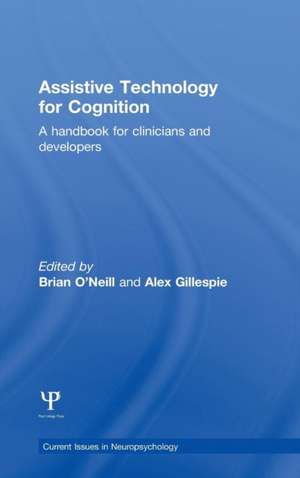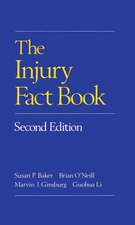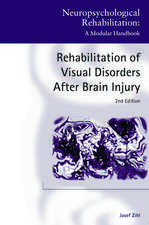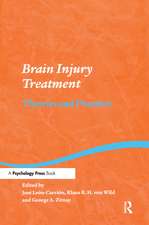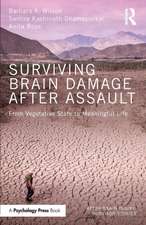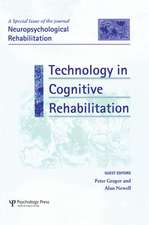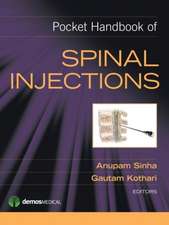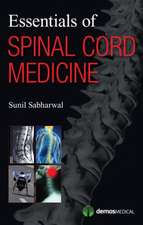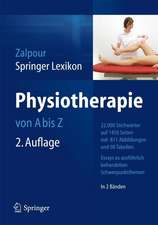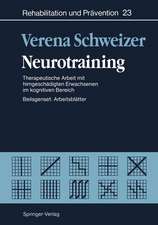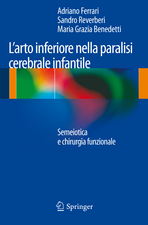Assistive Technology for Cognition: A handbook for clinicians and developers: Current Issues in Neuropsychology
Editat de Brian O'Neill, Alex Gillespieen Limba Engleză Hardback – 22 dec 2014
Written by experts in neuropsychology and technology development, Assistive Technology for Cognition provides a comprehensive overview of the efficacy of technologies to assist people with brain impairments. Based on the list provided by the International Classification of Function, each chapter covers a different cognitive function; namely, attention, memory, affect, perception, executive function, language, numeracy, sequencing, and navigation onto which existing and future assistive technologies for cognition are mapped. This structure provides in-depth research in an accessible way, and will allow practitioners to move from an assessment of cognitive deficits to the prescription of an appropriate assistive technology for cognition. The chapters also make suggestions for future developments.
Assistive Technology for Cognition will be of great interest to clinicians and researchers working in brain injury rehabilitation, technology developers, and also to students in clinical psychology, neuropsychology, and allied health disciplines.
| Toate formatele și edițiile | Preț | Express |
|---|---|---|
| Paperback (1) | 383.42 lei 43-57 zile | |
| Taylor & Francis – 22 dec 2014 | 383.42 lei 43-57 zile | |
| Hardback (1) | 998.40 lei 43-57 zile | |
| Taylor & Francis – 22 dec 2014 | 998.40 lei 43-57 zile |
Preț: 998.40 lei
Preț vechi: 1217.56 lei
-18% Nou
Puncte Express: 1498
Preț estimativ în valută:
191.05€ • 199.97$ • 159.01£
191.05€ • 199.97$ • 159.01£
Carte tipărită la comandă
Livrare economică 31 martie-14 aprilie
Preluare comenzi: 021 569.72.76
Specificații
ISBN-13: 9781848724013
ISBN-10: 1848724012
Pagini: 196
Ilustrații: 22
Dimensiuni: 156 x 234 x 15 mm
Greutate: 0.4 kg
Ediția:1
Editura: Taylor & Francis
Colecția Psychology Press
Seria Current Issues in Neuropsychology
Locul publicării:Oxford, United Kingdom
ISBN-10: 1848724012
Pagini: 196
Ilustrații: 22
Dimensiuni: 156 x 234 x 15 mm
Greutate: 0.4 kg
Ediția:1
Editura: Taylor & Francis
Colecția Psychology Press
Seria Current Issues in Neuropsychology
Locul publicării:Oxford, United Kingdom
Cuprins
1. Assistive Technology for Cognition Brian O’Neill and Alex Gillespie 2. Assistive Technology for Arousal, Alertness and Attention, Brian O’Neill and Tom Manly 3. Assistive Technology for Memory, Bonnie-Kate Dewar, Michael Kopelman, Narinder Kapur and Barbara A. Wilson 4. Affect-Aware Assistive Technologies, Omar AlZoubi, M. Sazzad Hussain and Rafael A. Calvo 5. Assistive Technology for Disorders of Visual Perception, Andrew Worthington and Jeremi Sudol 6. Assistive Technology for Executive Functions, Matthew Jamieson and Jonathan J Evans 7. Cognitive Support for Language and Social Interaction, Norman Alm 8. Assistive Technology for Supporting Learning Numeracy, Pekka Räsänen, Tanja Käser, Anna Wilson, Michael von Aster, Oleksandr Maslov and Unge Maslova 9. Assistive Technology for Psychomotor Functioning and Sequencing Complex Movements, Jennifer Boger and Alex Mihailidis 10. Cognitive Technologies for Wayfinding, Mark Harniss, Pat Brown and Kurt Johnson 11. The Future of Assistive Technology for Cognition, Brian O’Neill and Alex Gillespie
Notă biografică
Brian O'Neill is a Consultant in Neuropsychology and Rehabilitation with the Brain Injury Rehabilitation Trust, Glasgow, and Research Fellow at the University of Stirling, UK.
Alex Gillespie is Associate Professor in Social Psychology at the London School of Economics, UK.
Alex Gillespie is Associate Professor in Social Psychology at the London School of Economics, UK.
Recenzii
'Assistive Technology for Cognition features contributions by leading international researchers and practitioners in the area of cognitive intervention and rehabilitation. The book offers applications of today's technologies to the enhanced cognitive functioning of individuals with a wide spectrum of brain impairments. Importantly, in the dynamic cultures and technological environments in which we live, it is as much a book of the future as it is of today.' – Marcia J. Scherer, Professor of Physical Medicine and Rehabilitation, University of Rochester Medical Center, USA
'The International Classification of Function provides an effective organizing scheme for understanding diverse technologies. The authors provide a neuropsychological background on cognitive functions along with a review of technologies and supporting research, resulting in a book which will be a valuable asset for clinicians, researchers, and technology developers.' – Edmund LoPresti, AT Sciences, USA
'Assistive Technology for Cognition features contributions by leading international researchers and practitioners in the area of cognitive intervention and rehabilitation. The book offers applications of today's technologies to the enhanced cognitive functioning of individuals with a wide spectrum of brain impairments. Importantly, in the dynamic cultures and technological environments in which we live, it is as much a book of the future as it is of today.' – Marcia J. Scherer, Professor of Physical Medicine and Rehabilitation, University of Rochester Medical Center, USA
'The International Classification of Function provides an effective organizing scheme for understanding diverse technologies. The authors provide a neuropsychological background on cognitive functions along with a review of technologies and supporting research, resulting in a book which will be a valuable asset for clinicians, researchers, and technology developers.' – Edmund LoPresti, AT Sciences, USA
'The book will be most useful to readers wanting an introduction to a broad base of technological applications for ATC. The book provides ideas for clinicans searching for applications relevant to person with cognitive impairment. The functions are clear enough to also attract an audience of technology developers with perhaps limited knowledge of the human functions involved... The book might be inspiration to current or nascent researchers in the ATC field." - Michael Gilewski, Loma Linda University Medical Center, USA, PsycCRITIQUES
'The International Classification of Function provides an effective organizing scheme for understanding diverse technologies. The authors provide a neuropsychological background on cognitive functions along with a review of technologies and supporting research, resulting in a book which will be a valuable asset for clinicians, researchers, and technology developers.' – Edmund LoPresti, AT Sciences, USA
'Assistive Technology for Cognition features contributions by leading international researchers and practitioners in the area of cognitive intervention and rehabilitation. The book offers applications of today's technologies to the enhanced cognitive functioning of individuals with a wide spectrum of brain impairments. Importantly, in the dynamic cultures and technological environments in which we live, it is as much a book of the future as it is of today.' – Marcia J. Scherer, Professor of Physical Medicine and Rehabilitation, University of Rochester Medical Center, USA
'The International Classification of Function provides an effective organizing scheme for understanding diverse technologies. The authors provide a neuropsychological background on cognitive functions along with a review of technologies and supporting research, resulting in a book which will be a valuable asset for clinicians, researchers, and technology developers.' – Edmund LoPresti, AT Sciences, USA
'The book will be most useful to readers wanting an introduction to a broad base of technological applications for ATC. The book provides ideas for clinicans searching for applications relevant to person with cognitive impairment. The functions are clear enough to also attract an audience of technology developers with perhaps limited knowledge of the human functions involved... The book might be inspiration to current or nascent researchers in the ATC field." - Michael Gilewski, Loma Linda University Medical Center, USA, PsycCRITIQUES
Descriere
This book provides a comprehensive review of state-of-the-art assistive technology for each cognitive domain, and contributes to our understanding of the compensatory treatments available for cognitive impairment. It bridges the fields of neuropsychology and technology in order to advance the field of assistive technology for cognition, and improve the conditions of those with brain injury. Clinicians will consult it for current and future technologies, and technology developers will use it to help find direction for the development of new technologies.
